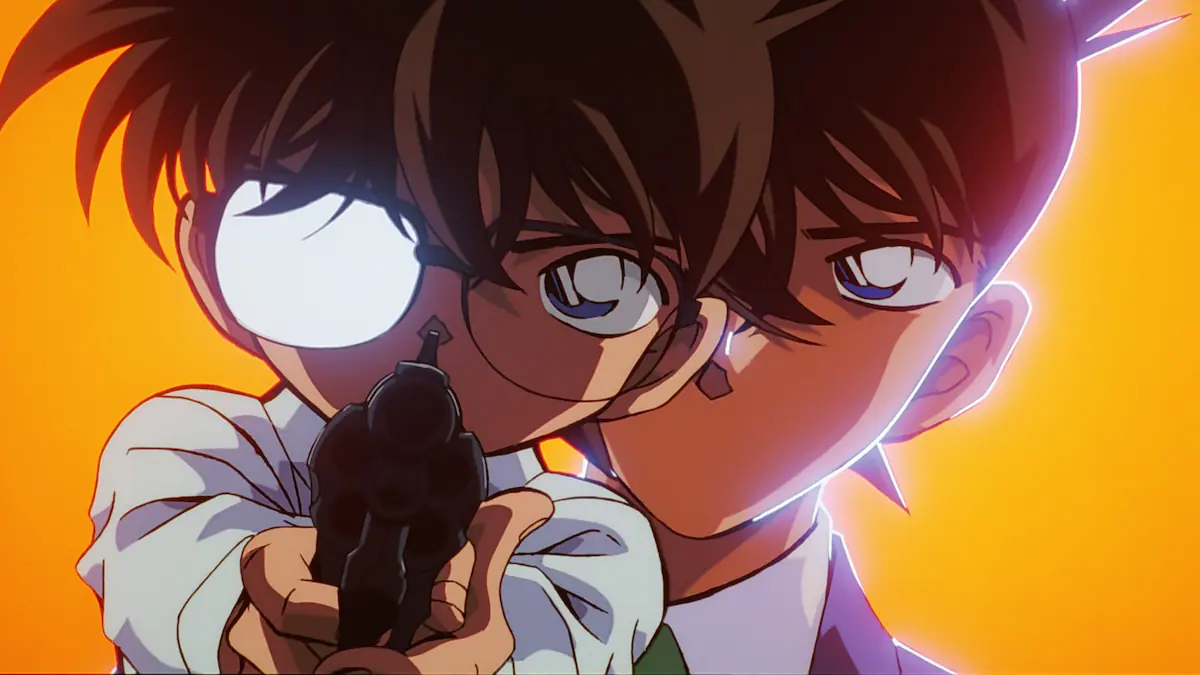Detective Conan: The Fourteenth Target: Even if it’s a fact that the old man shot the old woman, that doesn’t necessarily equal the truth, does it?
This line, spoken by Conan Edogawa (using Shinichi Kudo’s voice) to Ran Mori over the phone, is memorable from the second theatrical film, ‘Detective Conan: The Fourteenth Target’ (1998). With the upcoming theatrical film ‘Detective Conan: The Million Dollar Pentagram’ focusing on Kogoro Mori, set to be released on April 18th, this masterpiece is a must-watch. Suddenly, a series of attacks occur, targeting those close to Kogoro. From the short swords and flower motifs left at the scenes, it becomes clear that victims, whose names correspond to the numbers “thirteen” to “one” in playing cards, are being targeted in sequence. The man who emerges as a suspect in the investigation is Joe Murakami, recently paroled. He was a former trump card dealer whom Kogoro arrested 10 years ago. Conan, Ran, and Kogoro do their best to prevent further victims, but the culprit turns out to be an unexpected person. In this film, Kogoro’s wife, Eri Kisaki, makes her first appearance in the movies and is targeted second as the “Queen”, making this film stand out as the one that focuses most on the Mori family’s bonds among the theatrical works. While ‘Detective Conan: Strategy Above the Depths’ (2005) is another example of a ‘Kogoro’s cool movie’, where Kogoro shines, ‘Strategy Above the Depths’ depicts Kogoro’s coolness as a detective, whereas ‘The Fourteenth Target’ allows you to fully enjoy ‘Kogoro as a former detective’.
Kogoro Mori, the skilled former detective
Kogoro is usually seen as a drunkard with poor reasoning skills. However, this film reveals that he is actually ‘one of the top two handgun experts in the Metropolitan Police Department’. It’s also revealed in episode 28 of the anime, ‘Kogoro’s Class Reunion Murder Case’, that he was stronger than his classmate who won the national judo championship when he was at Miwa University, a judo powerhouse. That’s why he often secures criminals with a single shoulder throw. And in ‘The Fourteenth Target’, the reason why he quit the Metropolitan Police Department’s First Investigative Division to become a detective is revealed.

Back then, Murakami, whom he and his boss Megure arrested, took Eri hostage by snatching a police officer’s gun in the bathroom during interrogation, just as Eri was visiting Kogoro at work to deliver his change of clothes. Kogoro pointed his gun at him. Even with his reliable skills, he deliberately fired a shot that grazed Eri’s thigh, then shot Murakami’s left shoulder, taking him by surprise. Ran, who had forgotten about this incident due to the shock of witnessing it, couldn’t understand why her father shot her mother, and ended up being disappointed in Kogoro. However, his true intention was to hinder the escaping criminal by injuring the hostage’s leg, prioritizing saving the hostage over arresting the criminal. Furthermore, his efforts to capture the culprit who almost fell into the sea at the end of this film, to make him atone for his sins, also make ‘Detective Kogoro’ truly cool.
Clumsy Affection Aimed at Eri Kisaki
Although his reasoning is sloppy and he’s been told by Megure that he’s let numerous cases fall into a labyrinth, Kogoro was still an excellent detective. However, his firing at a hostage was viewed as a problem within the Metropolitan Police Department, and shortly after, Kogoro resigned. And around the same time, he separated from his wife Eri, with his clumsy affection for her in the background.
When the injured Eri, despite her painful leg, lovingly prepared a meal that night, Kogoro shouted, “If you’re going to make something like this, you should have gone to bed!” This was said with the intention of wanting her to rest, but Eri was furious at him calling her hard-earned cooking “something like this” and left the house. As Conan also mentions in this film, this was also related to Eri’s poor cooking skills, which later became a frequent cause of their arguments.

For the eight years they lived together after marriage, they were a loving couple, with Eri adjusting Kogoro’s tie as he went out. After that, they have been separated for 10 years due to the aforementioned major quarrel, but their mutual love is emphasized in this film and in regular anime episodes. Eri, being prideful, has a habit of always speaking sarcastically to Kogoro, but she also has a girlish side, sometimes hesitating whether to return home. When Kogoro asked for reconciliation, saying, “I’m reaching my limit,” she pretended not to hear but secretly rejoiced, showing a bit of a tsundere streak. Nevertheless, in ‘The Fourteenth Target’, they laugh about growing old together during dinner, reminisce about eating chocolate together in the park 15 years ago, and understand the true meaning of Eri being aimed at with a gun. It’s lovely to see them genuinely talking as a married couple.
‘The Fourteenth Target’ also emphasizes Ran’s family-oriented side, serving as a bond between them. It wouldn’t be an exaggeration to say that the biggest appeal of this film is the Mori family’s unity, with Kogoro’s clumsy yet unwavering love for his wife, Eri’s belief in her husband despite her nagging, and Ran’s more proactive involvement in the investigation than usual.



